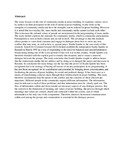| dc.description.abstract | The study focuses on the role of community media in peace building. It examines
various views by authors on their perception on the role of media in peace building. It
also looks at the strengths of community media and how the strengths can be utilized for
peace building. However it is noted that in everyday life, mass media and community
media cannot exclude each other. This is because the cultural values of people are
incorporated in the programming of mass media.
The study further explores the rationale for community media, which is
community participation. Participation is seen as both a means and an end in itself. The
advantage is that this medium allows parties to voice their concerns and engage in
dialogue about how to solve any new conflict that may arise, as well as how to sustain
peace.
Studio Ijambo is the case study of this research. Search for Common Ground
(SCG) helped establish the independent Studio Ijambo in Burundi in March 1995 as a
way of responding to the need for balanced and anti-inflammatory broadcasting during
one of the worst periods of the civil war in that country. Studio Ijambo was therefore
founded with the explicit goal to remedy this situation, and to create a renewed dialogue
between the groups. The study concludes that Studio Ijambo sought to address issues
that the mainstream media did not address and by doing so it changed the nature and
discourse in Burundi.
In conclusion the study brings out the fact that the power of Studio Ijambo has
been recognised due to its strategy of having all sectors of society participate in its
programming. It has also been recognized for its contribution and potential for bringing
about concretization, and facilitating the process of peace building for social and political
change. It has been seen as a means of transforming cultural values through their
reinforcement in peace building.
The study therefore recommends that the nature of the conflict and the concerns
of those affected are important. Different people in the community require different
information. The information must be relevant to each of these problems; and that
information must be .clearly spelt out. The flow of information within and from outside
are necessary aspects of any dialogue process. But the concern is the dimension of
meaning and values of peace building, the process through which meanings and values
are created, shared and contested within the system, and of which information is but only
one of the components. Therefore intensive horizontal communication within and among
the groups and communities is essential in the dialogue process. | en |

